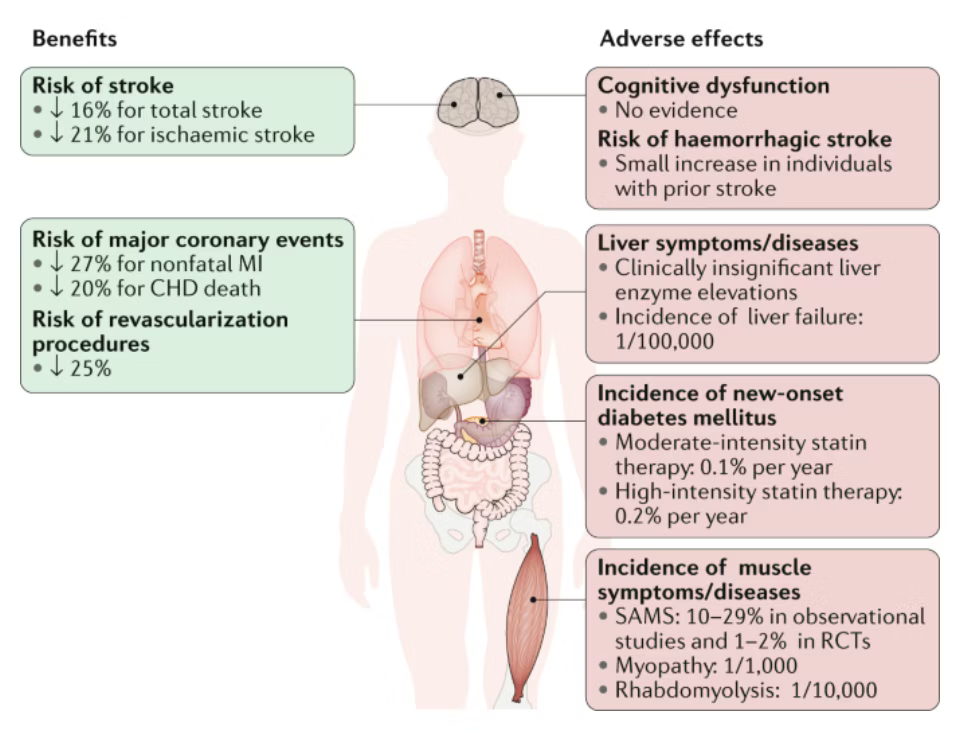High Cholesterol and ASCVD Risk
High cholesterol is a major risk factor for atherosclerotic cardiovascular disease (ASCVD). Statins are relatively inexpensive and offer a potent way of reducing cholesterol levels and therefore lowering ASCVD risk. Most individuals have no or very mild side-effects while taking a statin medication, especially when the statin is prescribed at a low to medium dose. Most of the potential cholesterol-lowering benefit of a given statin medication comes from taking just a quarter of its maximum potential dose. Of the statin family, rosuvastatin and atorvastatin offer the most potent cholesterol-lowering effect (Table 1).
| % LDL Reduction | Simvastatin (Zocor) | Atorvastatin (Lipitor) | Lovastatin (Mevacor) | Pravastatin (Pravachol) | Fluvastatin (Lescol) | Rosuvastatin (Crestor) | Pitavastatin (Livalo) |
|---|---|---|---|---|---|---|---|
| 27 | 10mg | – | 20mg | 20mg | 40mg | – | – |
| 34 | 20mg | 10mg | 40mg | 40mg | 80mg | – | 1mg |
| 41 | 40mg | 20mg | 80mg | 80mg | – | – | 2mg |
| 48 | 80mg | 40mg | – | – | – | 10mg | 4mg |
| 54 | – | 80mg | – | – | – | 20mg | – |
| 60 | – | – | – | – | – | 40mg | – |
| 54 | – | 80mg | – | – | – | 20mg | – |
| 60 | – | – | – | – | – | 40mg | – |
Table 1: Comparison of Different Statins on LDL-Cholesterol Reduction.1
Statin Intolerance and Potential Side Effects
Some individuals have intolerable side-effects such as myalgias (muscle pains) while taking a certain statin (Figure 1). Switching to a different statin medication or taking a lower dose may be helpful to alleviate these symptoms. Common concerns with statins are from mild worsening of liver blood tests and a small increase in likelihood of developing diabetes mellitus2. Statins may cause more rare but potentially serious health issues such as rhabdomyolysis, a condition that involves rapid breakdown of muscle cells. In those who have had a prior stroke, statin use has been linked to a small increase in risk of hemorrhagic stroke (brain bleed).3 Large-scale reviews and analyses suggest that there is no definitive evidence for statin use in causing dementia, contrary to some claims.4,5

Figure 1: Benefits and Adverse Effects of Statins.3
Statins vs. Newer Cholesterol-Lowering Agents
For the broader healthcare system, the benefits and affordability of statins favour their use for those with elevated cholesterol levels. Newer, more expensive agents such as bempedoic acid and PCSK9-inhibitors are effective alternatives to statins with fewer side effects and safety concerns. At present, most drug plans do not cover these medications for most individuals, and individuals may have to pay out of pocket to use these promising alternatives. In time the affordability of these agents should improve, and they may eventually replace statins as first-line medical therapy.
References
- Feingold, K.R., 2016. Cholesterol lowering drugs.
- Sattar N, Preiss D, Murray HM, Welsh P, Buckley BM, de Craen AJ, Seshasai SR, McMurray JJ, Freeman DJ, Jukema JW, Macfarlane PW. Statins and risk of incident diabetes: a collaborative meta-analysis of randomised statin trials. The Lancet. 2010 Feb 27;375(9716):735-42.
- Adhyaru BB, Jacobson TA. Safety and efficacy of statin therapy. Nature Reviews Cardiology. 2018 Dec;15(12):757-69.
- Richardson K, Schoen M, French B, Umscheid CA, Mitchell MD, Arnold SE, Heidenreich PA, Rader DJ, Degoma EM. Statins and cognitive function: a systematic review. Annals of internal medicine. 2013 Nov 19;159(10):688-97.
- Ott BR, Daiello LA, Dahabreh IJ, Springate BA, Bixby K, Murali M, Trikalinos TA. Do statins impair cognition? A systematic review and meta-analysis of randomized controlled trials. Journal of general internal medicine. 2015 Mar;30:348-58.
